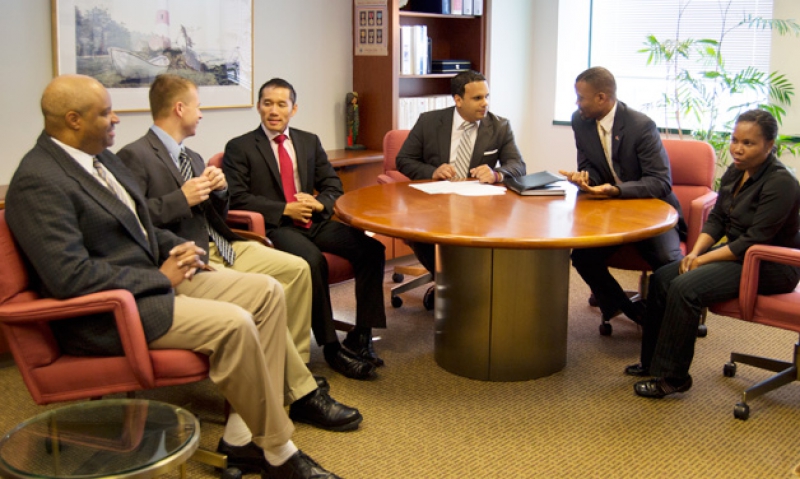
More emphasis on “soft skills” needed in new transition assistance program, says Legion.
In congressional testimony, The American Legion has presented its suggestions for improvement of the ever-evolving Transition Assistance Program (TAP). TAP offers job search assistance and related help to servicemembers returning to civilian life. It is a collaborative effort of the Departments of Defense (DoD), Veterans Affairs (VA) and Transportation (DOT) with the Department of Labor’s (DOL) Veterans’ Employment and Training Service (VETS).
In a written presentation to the House Committee on Veterans’ Affairs Economic Opportunity Subcommittee on Sept. 20, Legion Economic Division Assistant Director Davy Leghorn took note of recent enhancements to TAP in the form of the Transition GPS (Goals, Planning, Success) pilot program now being tested and assessed. As announced by President Obama in late July and touted as the first major revamping of TAP in more than two decades, the new transition preparedness curriculum would include broader and more personalized career and financial counseling, as well as a greater emphasis on the “nuts and bolts” of job seeking. Transition GPS would also provide separate training tracks for those wishing to go into business for themselves, thus echoing The American Legion’s ongoing small business development workshop series. It would also include a follow-up “career-tracking” segment.
As proposed, Transition GPS would last five to seven days with mandatory attendance for servicemembers and would be provided earlier and periodically throughout a servicemember’s military career. Currently, TAP is offered just before separation, it lasts three days and attendance is not mandated in some commands.
In its testimony, the Legion gave the Transition GPS program mixed reviews based upon initial pilot presentations at Randolph Air Force Base in Universal City, Texas, and Fort Hood, Texas. The program was offered to regular service personnel at Randolph, and Reserve and National Guard troops at Fort Hood who were returning from deployment.
“The DOL facilitator at Randolph received a standing ovation from the participants,” Leghorn wrote. “However, there were issues with the VA portion of the program. The VA facilitators were observed to be unprepared and were unable to answer questions that were asked by the participants. Instructors were not able to answer general knowledge questions that were posed and when they attempted to answer questions, the information was deemed to be inaccurate.”
The story was quite different at Fort Hood as Leghorn wrote of good presentations to a sparse and unreceptive audience. “Only 24 of the 150 (returning troops) attended the program,” Leghorn said. “The remaining members were not required to attend because they were actively employed or were enrolling in school. The 24 (who) attended were openly hostile because they apparently did not want to attend but were required to do so. A number of these were apparently upper level officers (who) were medical professionals and were unable to go home at the same time their units departed. It also appeared that the military portion of the class was designed for active duty and not for the Guard or Reserve contingent.
“Both the VA and the DOL portions of the program were reportedly well done, but may have ultimately done little good because of the lack of reception by the class members. It is evident that a separate briefing, especially designed for members of the Reserve and Guard, needs to be developed by DoD.”
The Legion offered other suggestions for improvement of Transition GPS; primarily that transition preparedness should focus more on schooling job seekers to market their so-called “soft skills” to the civilian workplace.
“Many servicemembers are from combat arms and non-skilled military specialties (that) are not readily transferable to the civilian labor market,” Leghorn said. “It is no secret that each business looks for a distinct mix of skills and experiences that pertain to their industry. And there is no argument that a veteran meeting the qualifications for a job vacancy brings an ample amount of skills and experiences to the table. However, on many occasions, being a functional expert is not enough, and making it past the initial filter of human resource staff remains a difficult task. To complement their core-competencies, there are certain ‘soft skills’ every company looks for in a potential hire.
“In speaking of ‘soft skills’, The American Legion refers to the personal qualities, habits, attitudes and social grace that can make a person compatible to work with. Human resource staff value soft skills because research shows that soft skills can be an important indicator of job performance. The American Legion (notes) that while there was ample focus on the transferring of military skills and experiences into core-competencies in the private sector, more emphasis should be placed on soft skills.”
This point was reiterated at the conclusion of Leghorn’s mostly encouraging and laudatory testimony. “There is much talk about ‘seamless transition’ between DoD and VA,” he said, “but the federal agencies have gone above and beyond. The agencies have involved themselves in this new transition assistance program which provides the ground work for this ‘seamless transition.’
“The American Legion reaffirms its strong support of the program, but also encourages the Department of Defense to make the capstone courses in education, entrepreneurship and vocational training mandatory for all separating, active-duty servicemembers, including those from the Reserves and the National Guard. Further, The American Legion asks the Department of Labor to tailor their courses to provide more emphasis on the soft skills civilian employers are looking for and a possible retooling for the Reserves and National Guard. Proceeding forward, The American Legion will support legislative initiatives that will guide the federal agencies to act accordingly.”
The new Transition GPS program is scheduled to be fully implemented by the end of 2013.
- Careers

